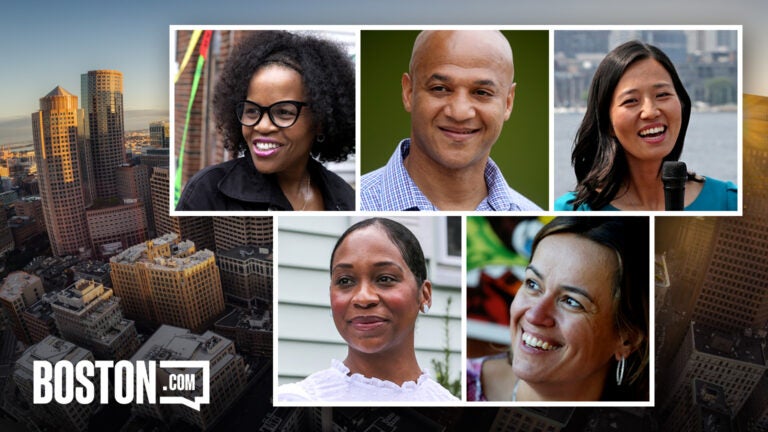Community
Visitors wished to know how the candidates would tackle meals injustice in Boston.

As the race of Boston’s future mayor picks up, the record of queries Boston inhabitants have for the candidates just retains expanding.
-

Boston.com sat down with every single significant candidate for mayor. Here’s what they assume about all the things.
We questioned Boston.com readers to submit their thoughts for the mayoral candidates, and they sent in inquiries spanning topics like education, housing, weather transform, and a lot more. Our reporters spoke with each individual prospect — Town Councilors Michelle Wu, Andrea Campbell, and Annissa Essaibi George, previous city economic enhancement main John Barros, and Performing Mayor Kim Janey — and received their answers.
1 reader desired to listen to how the candidates would deal with the issue of food items injustice in Boston neighborhoods. The pandemic led to a 55 percent rise in food stuff insecurity in the Commonwealth from 2019 to 2020, according to a survey by the Higher Boston Meals Financial institution.
For these struggling with acquiring more than enough meals, entry to healthy meals is an even more durable challenge. In some Boston neighborhoods like East Boston, it can be tricky to uncover grocery stores with a wide range of healthy selections.
In Massachusetts, candy and soda are exempt from the state’s 6.25 p.c profits tax because they are viewed as meals. Former governor Deval Patrick at the time regarded a junk meals tax, but it in no way grew to become a truth in the point out.
Is it time to rethink a junk food stuff tax in Boston? We requested the candidates for mayor a reader-submitted query about no matter if or not their administration would assistance a junk food items tax. They informed us their stance, and how they consider Boston need to address food injustice more broadly.
These responses have been edited for size and clarity.
“Food injustice is driving an being overweight and mental health crisis in our Black and brown communities. Junk food is inexpensive and effortless to accessibility though nutrient-dense, good quality foodstuff is difficult to obtain in our neighborhoods. Would you contemplate a soda or junk foods tax to assist commit in neighborhood farms, fitness and mental health services, and outdoor playgrounds?” — Brian, East Boston
Michelle Wu: I’ve place out a food stuff justice prepare basically … a minor beneath a calendar year in the past at this position to emphasize that food justice really should be at the coronary heart of our recovery. The incredibly first impacts, the most seen reminders of the pandemic, have been all food items similar: vacant grocery store shelves and food personnel who experienced misplaced their positions, and food items insecurity and starvation throughout our communities. And this is very a lot about connecting health and properly being and local weather to economic chance, and the large probable to build jobs in this area that provide our communities.
The City of Boston’s income increasing authority is minimal in contrast to other metropolitan areas, so in point we would not be capable to. Contrary to other cities that have accomplished this, we wouldn’t be ready to put into action this on our very own. I feel it is important to have conversations that will go through the point out Legislature about creating the money to deal with the impacts of our difficulties. So I’m content to discover techniques that we can greater match the impacts of corporatized action and the press to commercialization and unhealthy meals alternatives, with the day-to-working day impacts in our communities.
But there are several, a lot of other coverage selections that we have, and I have laid out a quantity of them in our strategy. It is anything from connecting our regional eating places and food firms with the resources to tackle our gaps in meals help and starvation. It is coordinating farmers’ marketplaces across the city to be certain that there is community accessibility to fresh new food stuff that is also economical, and eliminating any obstacles to applying SNAP and SNAP pounds and general public help for that.
And it is also making sure that as we are pondering about our meals programs, each and every motion from town governing administration and from our institutional associates can push to driving that possibility and health and sustainability as a result of our foodstuff units. So I think I referred perhaps previous time we talked to the food stuff justice ordinance that I had authored and passed in 2019, which hooked up specifications for Boston Public Faculties food stuff paying for. We must be increasing that and functioning with each individual key establishment and town to localize our foods creation and investing, which also normally makes healthier choices and entry to our people.
Andrea Campbell: I would think about it. And I think it is, all over again, a dialogue that we would just take and interact with just about every resident to just take component in.
I previously know that in specified sections of the town, it’s been a matter of discussion … I’m likely blank on the identify (an aide later verified Campbell was referring to the Mattapan Foodstuff & Fitness Coalition‘s Community Health Champions) … but the health champions who are functioning in partnership with our community bodegas and usefulness shops to get them to area the harmful foods in the back, to place the much healthier food items in the entrance, to do the job on switching selling prices — I think you can actually get a great deal carried out even prior to pushing for some of the taxes.
[H]ow does the metropolis of Boston make investments in all those types of businesses, and these champions, that are in [the] local community previously undertaking the perform, who are growing entry to farmers markets so they are all 12 months round, or turning lots into community gardens, creating work opportunities in the course of action, [and] making meals co-ops? (I’m a member of the Dorchester 1). So this is presently happening, it’s just a battle to get sources from the metropolis, and there’s resources there. We just have to have to be intentional.
And if we have to have even further sources, this could be one software that we totally should really discover.
Annissa Essaibi George: I never believe we want a tax on junk foodstuff. I believe we require education. We need to have to make positive that it is easier than ever for people to get healthy food items. We have noticed all over again more than this very last year-and-a-half, it is wonderful what a awful crisis has shown to us as a metropolis, and as a entire world, what we can basically do with willpower and making positive that we’re incredibly much targeted on farm to table from local farm to nearby desk, creating certain that we are supporting, specially our youthful folks, in accessing food. One of the motives why we delayed closing university last calendar year is for the reason that we understood so quite a few of our youngsters who depend on college meals for nutrition weren’t heading to get it, but we rapidly figured out how to get them food … [O]ver a brief period of time we explained, “OK, we have received them food. We have obtained the calories. Now let’s figure out the nutritional value. Let us make certain that we’re equipped to get all those contemporary fruits and greens, greater top quality meats, the necessary proteins for our people.” That’s the place we’ve acquired to emphasis our power. A tax does not do it.
John Barros: So the response is of course, I do support a tax. But it just simply cannot be a tax. Why? Simply because I know how tough it is to get my children not to have soda, dammit. I check out challenging [laughs]. You really should see the treats, right? I know the difficulties all over it, but which is low-cost meals for a whole lot of persons. It’s foods that they can acquire, that they can afford to pay for for their child. And so we’re taxing the lousy, because that’s who purchases it.
If there’s going to be a tax, then we’ve obtained to figure out who’s spending that tax, and we know who’s spending that tax essentially. We’ve acquired to figure out what we’re performing to assist as we get rid of the solutions in universities, as we get rid of the selections in camps, as we get rid of the possibilities in distinctive sites, and then improve healthy food choices.
So it’s possible that tax is paying for a lot more healthy food items alternatives. I know a single of the things we did in our neighborhood was function with the various bodegas to make confident they experienced healthy foods and available food. It doesn’t transfer as quickly. It doesn’t make as significantly money. It is more durable to continue to keep.
So I question if we can offset the expense from a single to the other, so we are in some way making it simpler for the identical bad Black and brown folks to have healthy foodstuff. So I’m for the tax … mainly because I want to make it that the food is not affordable. We most likely couldn’t tax it as large as I’d like to tax it [laughs]. But I want to for the reason that a person of the points is it is a low-cost alternate. And we’ve got to build more cost-effective choices. That is the largest matter for me. Let’s get that tax cash, let’s subsidize one thing which is cheaper, that we could place up coming to these points or as an alternative of these items, and continue to keep it going.
Kim Janey: Which is a good concern. I would say this: The reader is definitely suitable in his analysis. And I, as a person who’s expert foodstuff insecurity, know what it’s like to rely on corner merchants and sub stores, basically, for like my major foods as element of my childhood. Unquestionably suitable.
I also live near a supermarket. It’s now … Selling price Ceremony but it applied to be Preserve A Great deal, and in Conserve A Lot, there was no juice. They had practically no true juice in the retailer, the grocery store. It was ‘drink,’ which is h2o, sugar, and food coloring. Not a single option was actual. So it’s a true difficulty.
I have invested more dollars into our foodstuff access department below in the Metropolis of Boston. I’m a huge proponent of community gardens. I, you know, think about myself — nicely, I applied to be an city farmer. I haven’t had significantly time for that, but I want us to do significantly additional expenditure in neighborhood gardens, not just ones that exist, but working with some of our public land to generate a lot more community gardens and require little ones as properly all the way up to our seniors in that work.
Editor’s observe: Candidates for mayor of Boston will contend in a preliminary election Tuesday, Sept. 14, with the best two finishers experiencing off in the general election on Tuesday, Nov. 2.
To maintain observe of the news of the race as it takes place, comply with alongside with Boston.com’s election are living web site and make certain to go to our applicant facts page regularly for prospect Q&As, together with further protection of the race as the preliminary election approaches.
Publication Signup
Keep up to date on all the latest information from Boston.com





More Stories
The Health Benefits Of Chicken Curry Recipes
Guide To Deep Fryers
3 Unbelievable Peanut Butter Recipes For The Grill